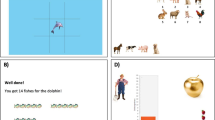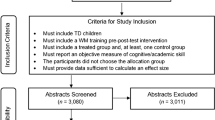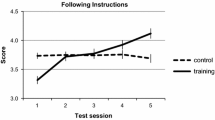Abstract
Process-based working memory (WM) training in typically develo** children usually leads to short- and long-term improvements on untrained WM tasks. However, results are mixed regarding far transfer to academic and cognitive abilities. Moreover, there is a lack of studies jointly evaluating the different types of transfer, using an adequate design and considering motivational factors. In addition, evidence is needed about how pre-training performance is related to individual differences in training-induced transfer. Therefore, this study aimed to implement and evaluate the efficacy of a computerized process-based WM training in typically develo** school-age children. Near and far transfer effects were evaluated both immediately after training and after 6 months, as well as individual differences in training-induced transfer. The sample was composed of 89 typically develo** children aged 9–10 years (M = 9.52, SD = 0.30), who were randomized to a WM training group or an active control group. They were evaluated at pre-training, post-training, and follow-up phases with measures of visuospatial and verbal WM, reading comprehension, math computation, and fluid intelligence. Results showed that the training group significantly improved performance in verbal WM and fluid intelligence compared to the active control group, immediately after training and after 6 months. Trained children with lower initial performance in verbal WM or fluid intelligence showed greater transfer gains. No group differences were found in motivational factors. Findings of this study suggest that process-based WM training may promote transfer to cognitive abilities and lead to compensation effects of individual differences in typically develo** school-age children.
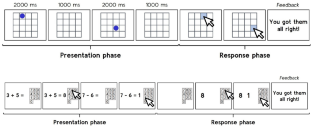
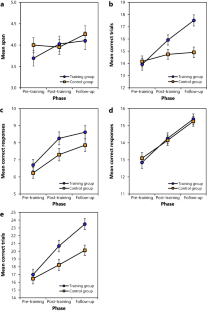
Similar content being viewed by others
Data availability
The data supporting the results of this review are available from the corresponding author upon reasonable request.
Code availability
Not applicable.
Notes
It may be possible that by using an average score, differences between groups in any of the Intrinsic Motivation Inventory dimensions might have been balanced out. Thus, additional t-tests were run separately on the scores of each dimension to check for differences between the training group and active control group. Results suggest no significant differences between groups in children from the initial sample: interest/enjoyment, t (87) = 0.015, p = .988, d = 0.003; perceived competence, t (77.55) = 1.014, p = .314, d = 0.214; effort/importance, t (74.94) = 1.600, p = .114, d = 0.335; as well as in children that participated in all the assessment phases of the study: interest/enjoyment, t (80) = 0.234, p = .815, d = 0.052; perceived competence, t (69.77) = 0.471, p = .639, d = 0.105; effort/importance, t (70.71) = 1.577, p = .119, d = 0.388.
References
Abusamra, V., Ferreres, A., Raiter, A., De Beni, R., & Cornoldi, C. (2010). Test Leer para Comprender TLC: Evaluación de la comprensión de textos. Paidós.
Alloway, T. P., Bibile, V., & Lau, G. (2013). Computerized working memory training: Can it lead to gains in cognitive skills in students? Computers in Human Behavior, 29(3), 632–638. https://doi.org/10.1016/j.chb.2012.10.023
Alloway, T. P., & Copello, E. (2013). Working memory: The what, the why, and the how. The Australian Educational and Developmental Psychologist, 30(2), 105–118. https://doi.org/10.1017/edp.2013.13
Alloway, T. P., Gathercole, S. E., & Pickering, S. J. (2006). Verbal and visuospatial short-term and working memory in children: Are they separable? Child Development, 77(6), 1698–1716. https://doi.org/10.1111/j.1467-8624.2006.00968.x
Andrés, M. L., Stelzer, F., Vernucci, S., Canet-Juric, L., Galli, J. I., & Navarro Guzmán, J. I. (2017). Regulación emocional y habilidades académicas: Relación en niños de 9 a 11 años de edad. Suma Psicologica, 24(2), 79–86. https://doi.org/10.1016/j.sumpsi.2017.07.001
Appelgren, A., Bengtsson, S. L., & Söderqvist, S. (2016). Incremental view on intelligence and high intrinsic motivation increase working memory training compliance. Applied Cognitive Psychology, 30(2), 289–293. https://doi.org/10.1002/acp.3184
Baddeley, A. D. (2012). Working memory: Theories, models, and controversies. Annual Review of Psychology, 63, 1–29. https://doi.org/10.1146/annurev-psych-120710-100422
Barnett, S. M., & Ceci, S. J. (2002). When and where do we apply what we learn?: A taxonomy for far transfer. Psychological Bulletin, 128(4), 612–637. https://doi.org/10.1037/0033-2909.128.4.612
Bergman Nutley, S., Söderqvist, S., Bryde, S., Thorell, L. B., Humphreys, K., & Klingberg, T. (2011). Gains in fluid intelligence after training non-verbal reasoning in 4-year-old children: A controlled, randomized study. Developmental Science, 14(3), 591–601. https://doi.org/10.1111/j.1467-7687.2010.01022.x
Best, J. R., Miller, P. H., & Naglieri, J. A. (2011). Relations between executive function and academic achievement from ages 5 to 17 in a large, representative national simple. Learning and Individual Differences, 21(4), 327–336. https://doi.org/10.1016/j.lindif.2011.01.007
Blackwell, L. S., Trzesniewski, K. H., & Dweck, C. S. (2007). Implicit theories of intelligence predict achievement across an adolescent transition: A longitudinal study and an intervention. Child Development, 78(1), 246–263. https://doi.org/10.1111/j.1467-8624.2007.00995.x
Blakey, E., & Carroll, D. J. (2015). A short executive function training program improves working memory in preschoolers. Frontiers in Psychology. https://doi.org/10.3389/fpsyg.2015.01827
Boot, W. R., Simons, D. J., Stothart, C., & Stutts, C. (2013). The pervasive problem with placebos in psychology: Why active control groups are not sufficient to rule out placebo effects. Perspectives on Psychological Science, 8(4), 445–454. https://doi.org/10.1177/1745691613491271
Borella, E., & de Ribaupierre, A. (2014). The role of working memory, inhibition, and processing speed in text comprehension in children. Learning and Individual Differences, 34, 86–92. https://doi.org/10.1016/j.lindif.2014.05.001
Bull, R., & Lee, K. (2014). Executive functioning and mathematics achievement. Child Development Perspectives, 8(1), 36–41. https://doi.org/10.1111/cdep.12059
Campos, I. S., Almeida, L. S., Ferreira, A. I., & Martinez, L. F. (2013). Working memory as separable subsystems: A study with Portuguese primary school children. Spanish Journal of Psychology, 16, E14. https://doi.org/10.1017/sjp.2013.6
Canet-Juric, L., Stelzer, F., Andrés, M. L., Vernucci, S., Introzzi, I., & Burin, D. I. (2018). Evidencias de validez de una tarea computarizada de memoria de trabajo verbal y viso-espacial para niños. Revista Interamericana De Psicología/interamerican Journal of Psychology, 52(1), 112–128.
Canet-Juric, L., Burin, D. I., Andrés, M. L., & Urquijo, S. (2013). Perfil cognitivo de niños con rendimientos bajos en comprensión lectora. Anales De Psicología, 29(3), 996–1005. https://doi.org/10.6018/analesps.29.3.138221
Cardoso, C. de O., Dias, N., Senger, J., Colling, A. P. C., Seabra, A. G., & Fonseca, R. P. (2018). Neuropsychological stimulation of executive functions in children with typical development: A systematic review. Applied Neuropsychology: Child, 7(1), 61–81. https://doi.org/10.1080/21622965.2016.1241950
Center for Self-Determination Theory (n.d.). Intrinsic Motivation Inventory (IMI). Retrieved March 19, 2021, from http://selfdeterminationtheory.org/intrinsic-motivation-inventory/
Cohen, J. (1988). Statistical power analysis for the behavioral sciences (2nd ed.). Lawrence Erlbaum Associates.
Conway, A. R. A., Jarrold, C., Kane, M. J., Miyake, A., & Towse, J. N. (2007). Variation in working memory: An introduction. In A. R. A. Conway, C. Jarrold, M. J. Kane, A. Miyake, & J. N. Towse (Eds.), Variation in working memory (pp. 3–17). Oxford University Press.
Conway, A. R. A., Kane, M. J., Bunting, M. F., Hambrick, D. Z., Wilhelm, O., & Engle, R. W. (2005). Working memory span tasks: A methodological review and user’s guide. Psychonomic Bulletin & Review, 12(5), 769–786. https://doi.org/10.3758/bf03196772
Cragg, L., Keeble, S., Richardson, S., Roome, H. E., & Gilmore, C. (2017). Direct and indirect influences of executive functions on mathematics achievement. Cognition, 162, 12–26. https://doi.org/10.1016/j.cognition.2017.01.014
Cragg, L., & Gilmore, C. (2014). Skills underlying mathematics: The role of executive function in the development of mathematics proficiency. Trends in Neuroscience and Education, 3(2), 63–68. https://doi.org/10.1016/j.tine.2013.12.001.
Cumming, G. (2012). Understanding the new statistiscs: Effect sizes, confidence intervals, and meta-analysis. Routledge.
Dehn, M. J. (2017). How working memory enables fluid reasoning. Applied Neuropsychology: Child, 6(3), 245–247. https://doi.org/10.1080/21622965.2017.1317490
Diamond, A., & Ling, D. S. (2016). Conclusions about interventions, programs, and approaches for improving executive functions that appear justified and those that, despite much hype, do not. Developmental Cognitive Neuroscience, 18, 34–48. https://doi.org/10.1016/j.dcn.2015.11.005
Dörrenbächer, S., Müller, P. M., Tröger, J., & Kray, J. (2014). Dissociable effects of game elements on motivation and performance in a cognitive-control training in middle childhood. Frontiers in Psychology. https://doi.org/10.3389/fpsyg.2014.01275
Dweck, C. S. (2006). Mindset: The new psychology of success. Ballantine Books.
Dweck, C. S. (2000). Self-theories: Their role in motivation, personality, and development. Psychology Press.
Dweck, C. S., & Yeager, D. S. (2019). Mindsets: A view from two eras. Perspectives on Psychological Science, 14(3), 481–496. https://doi.org/10.1177/1745691618804166
Engel de Abreu, P. M. J., Conway, A. R. A., & Gathercole, S. E. (2010). Working memory and fluid intelligence in young children. Intelligence, 38(6), 552–561. https://doi.org/10.1016/j.intell.2010.07.003
Faul, F., Erdfelder, E., Lang, A.-G., & Buchner, A. (2007). G*Power 3: A flexible statistical power analysis program for the social, behavioral, and biomedical sciences. Behavior Research Methods, 39(2), 175–191. https://doi.org/10.3758/BF03193146
Ferrer, E., O’Hare, E. D., & Bunge, S. A. (2009). Fluid reasoning and the develo** brain. Frontiers in Neuroscience, 3(1), 46–51. https://doi.org/10.3389/neuro.01.003.2009
Field, A. (2013). Discovering statistics using IBM SPSS Statistics (4th ed.). Sage.
Follmer, D. J. (2018). Executive function and reading comprehension: A meta-analytic review. Educational Psychologist, 53(1), 42–60. https://doi.org/10.1080/00461520.2017.1309295
Friso-van den Bos, I., van der Ven, S. H. G., Kroesbergen, E. H., & van Luit, J. E. H. (2013). Working memory and mathematics in primary school children: A meta-analysis. Educational Research Review, 10, 29–44. https://doi.org/10.1016/j.edurev.2013.05.003
George, D., & Mallery, P. (2016). IBM SPSS statistics 23 step by step (14th ed.). Routledge.
Giofrè, D., Mammarella, I. C., & Cornoldi, C. (2013). The structure of working memory and how it relates to intelligence in children. Intelligence, 41(5), 396–406. https://doi.org/10.1016/j.intell.2013.06.006
Gray, S., Green, S., Alt, M., Hogan, T., Kuo, T., Brinkley, S., & Cowan, N. (2017). The structure of working memory in young children and its relation to intelligence. Journal of Memory and Language, 92, 183–201. https://doi.org/10.1016/j.jml.2016.06.004
Green, C. S., Bavelier, D., Kramer, A. F., Vinogradov, S., Ansorge, U., Ball, K. K., Bingel, U., Chein, J. M., Colzato, L. S., Edwards, J. D., Facoetti, A., Gazzaley, A., Gathercole, S. E., Ghisletta, P., Gori, S., Granic, I., Hillman, C. H., Hommel, B., Jaeggi, S. M., ... Witt, C. M. (2019). Improving methodological standards in behavioral interventions for cognitive enhancement. Journal of Cognitive Enhancement, 3(1), 2–29. https://doi.org/10.1007/s41465-018-0115-y
Green, C. S., Strobach, T., & Schubert, T. (2014). On methodological standards in training and transfer experiments. Psychological Research Psychologische Forschung, 78(6), 756–772. https://doi.org/10.1007/s00426-013-0535-3
Haimovitz, K., & Dweck, C. S. (2017). The origins of children’s growth and fixed mindsets: New research and a new proposal. Child Development, 88(6), 1849–1859. https://doi.org/10.1111/cdev.12955
Hale, S., Bronik, M. D., & Fry, A. F. (1997). Verbal and spatial working memory in school-age children: Developmental differences in susceptibility to interference. Developmental Psychology, 33(2), 364–371. https://doi.org/10.1037/0012-1649.33.2.364
Hale, S., Myerson, J., Emery, L. J., Lawrence, B. M., & DuFault, C. (2007). Variation in working memory across the life span. In A. R. A. Conway, C. Jarrold, M. J. Kane, A. Miyake, & J. N. Towse (Eds.), Variation in working memory (pp. 194–224). Oxford University Press.
Hedges, L. V., & Olkin, I. (1985). Statistical methods for meta-analysis. Academic Press.
Hitchcock, C., & Westwell, M. S. (2016). A cluster-randomised, controlled trial of the impact of Cogmed working memory training on both academic performance and regulation of social, emotional and behavioural challenges. Journal of Child Psychology and Psychiatry, 58(2), 140–150. https://doi.org/10.1111/jcpp.12638
Hobeika, L., Diard-Detoeuf, C., Garcin, B., Levy, R., & Volle, E. (2016). General and specialized brain correlates for analogical reasoning: A meta-analysis of functional imaging studies. Human Brain Map**, 37(5), 1953–1969. https://doi.org/10.1002/hbm.23149
Hollingshead, A. B. (2011). Four factor index of social status. Yale Journal of Sociology, 8, 21–52.
Injoque-Ricle, I., Calero, A. D., Alloway, T. P., & Burin, D. I. (2011). Assessing working memory in Spanish-speaking children: Automated Working Memory Assessment battery adaptation. Learning and Individual Differences, 21(1), 78–84. https://doi.org/10.1016/j.lindif.2010.09.012
Jaeggi, S. M., & Buschkuehl, M. (2014). Working memory training and transfer: Theoretical and practical considerations. In B. Toni (Ed.), New Frontiers of Multidisciplinary Research in STEAM-H (Science, Technology, Engineering, Agriculture, Mathematics, and Health) (pp. 19–43). Springer.
Jaeggi, S. M., Buschkuehl, M., Jonides, J., & Shah, P. (2011). Short- and long-term benefits of cognitive training. Proceedings of the National Academy of Sciences of the United States of America, 108(25), 10081–10086. https://doi.org/10.1073/pnas.1103228108
Jaeggi, S. M., Buschkuehl, M., Shah, P., & Jonides, J. (2014). The role of individual differences in cognitive training and transfer. Memory & Cognition, 42(3), 464–480. https://doi.org/10.3758/s13421-013-0364-z
Johann, V. E., & Karbach, J. (2020). Effects of game-based and standard executive control training on cognitive and academic abilities in elementary school children. Developmental Science, 23(4), 1–18. https://doi.org/10.1111/desc.12866
Jolles, D. D., & Crone, E. A. (2012). Training the develo** brain: A neurocognitive perspective. Frontiers in Human Neuroscience. https://doi.org/10.3389/fnhum.2012.00076
Karbach, J., & Unger, K. (2014). Executive control training from middle childhood to adolescence. Frontiers in Psychology. https://doi.org/10.3389/fpsyg.2014.00390
Karbach, J., Könen, T., & Spengler, M. (2017). Who benefits the most? Individual differences in the transfer of executive control training in younger and older adults. Journal of Cognitive Enhancement, 1(4), 394–405. https://doi.org/10.1007/s41465-017-0054-z
Karbach, J., Strobach, T., & Schubert, T. (2015). Adaptive working-memory training benefits reading, but not mathematics in middle childhood. Child Neuropsychology, 21(3), 285–301. https://doi.org/10.1080/09297049.2014.899336
Katz, B., Jones, M. R., Shah, P., Buschkuehl, M., & Jaeggi, S. M. (2016). Individual differences and motivational effects. In T. Strobach & J. Karbach (Eds.), Cognitive training: An overview of features and applications (pp. 157–166). Springer.
Klingberg, T. (2010). Training and plasticity of working memory. Trends in Cognitive Sciences, 14(7), 317–324. https://doi.org/10.1016/j.tics.2010.05.002
Könen, T., Strobach, T., & Karbach, J. (2016). Working memory. In T. Strobach & J. Karbach (Eds.), Cognitive training: An overview of features and applications (pp. 59–68). Springer.
Kray, J., & Ferdinand, N. K. (2013). How to improve cognitive control in development during childhood: Potentials and limits of cognitive interventions. Child Development Perspectives, 7(2), 121–125. https://doi.org/10.1111/cdep.12027
Lakens, D. (2013). Calculating and reporting effect sizes to facilitate cumulative science: A practical primer for t-tests and ANOVAs. Frontiers in Psychology. https://doi.org/10.3389/fpsyg.2013.00863
Loosli, S. V., Buschkuehl, M., Perrig, W. J., & Jaeggi, S. M. (2012). Working memory training improves reading processes in typically develo** children. Child Neuropsychology, 18(1), 62–78. https://doi.org/10.1080/09297049.2011.575772
Mansur-Alves, M., Flores-Mendoza, C., & Tierra-Criollo, C. J. (2013). Evidências preliminares da efetividade do treinamento cognitivo para melhorar a inteligência de crianças escolares. Psicologia: Reflexão e Crítica, 26(3), 423–434.
Mansur-Alves, M., & Flores-Mendoza, C. (2015). Working memory training does not improve intelligence: Evidence from brazilian children. Psicologia: Reflexão e Crítica, 28(3), 474–482. https://doi.org/10.1590/1678-7153.201528306
McAuley, E., Duncan, T., & Tammen, V. V. (1989). Psychometric properties of the Intrinsic Motivation Inventory in a competitive sport setting: A confirmatory factor analysis. Research Quarterly for Exercise and Sport, 60(1), 48–58. https://doi.org/10.1080/02701367.1989.10607413
McGrew, K. S. (2009). CHC theory and the human cognitive abilities project: Standing on the shoulders of the giants of psychometric intelligence research. Intelligence, 37(1), 1–10. https://doi.org/10.1016/j.intell.2008.08.004
Melby-Lervåg, M., Redick, T., & Hulme, C. (2016). Working memory training does not improve performance on measures of intelligence or other measures of “far transfer”: Evidence from a meta-analytic review. Perspectives on Psychological Science, 11(4), 512–534. https://doi.org/10.1177/1745691616635612
Moreau, D., Kirk, I. J., & Waldie, K. E. (2016). Seven pervasive statistical flaws in cognitive training interventions. Frontiers in Human Neuroscience. https://doi.org/10.3389/fnhum.2016.00153
Morrison, A. B., & Chein, J. M. (2011). Does working memory training work? The promise and challenges of enhancing cognition by training working memory. Psychonomic Bulletin & Review, 18(1), 46–60. https://doi.org/10.3758/s13423-010-0034-0
Motter, J. N., Devanand, D. P., Doraiswamy, P. M., & Sneed, J. R. (2016). Clinical trials to gain FDA approval for computerized cognitive training: What is the ideal control condition? Frontiers in Aging Neuroscience. https://doi.org/10.3389/fnagi.2016.00249
Pascual, L., Galperín, C. Z., & Bornstein, M. H. (1993). La medición del nivel socioeconómico y la psicología evolutiva: El caso argentino. Revista Interamericana De Psicología/interamerican Journal of Psychology, 27(1), 59–74.
Peng, P., Barnes, M., Wang, C., Wang, W., Li, S., Swanson, H. L., Dardick, W., & Tao, S. (2018). A meta-analysis on the relation between reading and working memory. Psychological Bulletin, 144(1), 48–76. https://doi.org/10.1037/bul0000124
Peng, P., Namkung, J., Barnes, M., & Sun, C. (2016). A meta-analysis of mathematics and working memory: Moderating effects of working memory domain, type of mathematics skill, and sample characteristics. Journal of Educational Psychology, 108(4), 455–473. https://doi.org/10.1037/edu0000079
Raghubar, K. P., Barnes, M. A., & Hecht, S. A. (2010). Working memory and mathematics: A review of developmental, individual difference, and cognitive approaches. Learning and Individual Differences, 20(2), 110–122. https://doi.org/10.1016/j.lindif.2009.10.005
Rapport, M. D., Orban, S. A., Kofler, M. J., & Friedman, L. M. (2013). Do programs designed to train working memory, other executive functions, and attention benefit children with ADHD? A meta-analytic review of cognitive, academic, and behavioral outcomes. Clinical Psychology Review, 33(8), 1237–1252. https://doi.org/10.1016/j.cpr.2013.08.005
Redick, T. S., & Lindsey, D. R. B. (2013). Complex span and n-back measures of working memory: A meta-analysis. Psychonomic Bulletin & Review, 20(6), 1102–1113. https://doi.org/10.3758/s13423-013-0453-9
Redick, T. S., Shipstead, Z., Wiemers, E. A., Melby-Lervåg, M., & Hulme, C. (2015). What’s working in working memory training? An Educational Perspective. Educational Psychology Review, 27(4), 617–633. https://doi.org/10.1007/s10648-015-9314-6
Rode, C., Robson, R., Purviance, A., Geary, D. C., & Mayr, U. (2014). Is working memory training effective? A study in a school setting. PLoS ONE, 9(8), e104796. https://doi.org/10.1371/journal.pone.0104796
Rueda, M. R., Cómbita, L. M., & Pozuelos, J. P. (2016). Childhood and adolescence. In T. Strobach & J. Karbach (Eds.), Cognitive training: An overview of features and applications (pp. 33–44). Springer.
Ryan, R. M., & Deci, E. L. (2000). Intrinsic and extrinsic motivations: Classic definitions and new directions. Contemporary Educational Psychology, 25(1), 54–67. https://doi.org/10.1006/ceps.1999.1020
Sala, G., & Gobet, F. (2017). Working memory training in typically develo** children: A meta-analysis of the available evidence. Developmental Psychology, 53(4), 671–685. https://doi.org/10.1037/dev0000265
Sala, G., & Gobet, F. (2019). Cognitive training does not enhance general cognition. Trends in Cognitive Sciences, 23(1), 9–20. https://doi.org/10.1016/j.tics.2018.10.004
Sánchez-Pérez, N., Castillo, A., López-López, J. A., Pina, V., Puga, J. L., Campoy, G., González-Salinas, C., & Fuentes, L. J. (2018). Computer-based training in math and working memory improves cognitive skills and academic achievement in primary school children: Behavioral results. Frontiers in Psychology. https://doi.org/10.3389/fpsyg.2017.02327
Sautú, R. (1989). Teoría y técnica en la medición del status ocupacional: Escalas objetivas de prestigio (Working document). Universidad de Buenos Aires.
Schmiedek, F. (2016). Methods and designs. In T. Strobach & J. Karbach (Eds.), Cognitive training: An overview of features and applications (pp. 9–18). Springer.
Shadish, W. R., Cook, T. D., & Campbell, D. T. (2002). Experimental and quasi-experimental designs for generalized causal inference. Houghton Mifflin.
Shipstead, Z., Redick, T. S., & Engle, R. W. (2012). Is working memory training effective? Psychological Bulletin, 138(4), 628–654. https://doi.org/10.1037/a0027473
Smid, C. R., Karbach, J., & Steinbeis, N. (2020). Toward a science of effective cognitive training. Current Directions in Psychological Science, 29(6), 531–537. https://doi.org/10.1177/0963721420951599
Snelbaker, A. J., Wilkinson, G. S., Robertson, G. J., & Glutting, J. J. (2001). Wide Range Achievement Test 3 (WRAT3). In W. I. Dorfman & M. Hersen (Eds.), Understanding psychological assessment (pp. 259–274). Springer.
Söderqvist, S., & Bergman Nutley, S. (2015). Working memory training is associated with long term attainments in math and reading. Frontiers in Psychology. https://doi.org/10.3389/fpsyg.2015.01711
Swanson, H. L., & Alloway, T. P. (2012). Working memory, learning, and academic achievement. In K. R. Harris, S. Graham, T. Urdan, C. B. McCormick, G. M. Sinatra, & J. Sweller (Eds.), APA educational psychology handbook, Vol. 1: Theories, constructs, and critical issues (pp. 327–366). American Psychological Association.
Taborda, A., Barbenza, C., & Brenlla, M. E. (2011). Adaptación argentina del WISC-IV. In D. Wechsler (Ed.), Escala de Inteligencia de Wechsler para niños cuarta edición (WISC-IV). Paidós.
Tillman, C. M., Nyberg, L., & Bohlin, G. (2008). Working memory components and intelligence in children. Intelligence, 36(5), 394–402. https://doi.org/10.1016/j.intell.2007.10.001
Titz, C., & Karbach, J. (2014). Working memory and executive functions: Effects of training on academic achievement. Psychological Research Psychologische Forschung, 78(6), 852–868. https://doi.org/10.1007/s00426-013-0537-1
Towse, J. N., Hitch, G. J., & Hutton, U. (1998). A reevaluation of working memory capacity in children. Journal of Memory and Language, 39(2), 195–217. https://doi.org/10.1006/jmla.1998.2574
Traut, H. J., Guild, R. M., & Munakata, Y. (2021). Why does cognitive training yield inconsistent benefits? A meta-analysis of individual differences in baseline cognitive abilities and training outcomes. Frontiers in Psychology. https://doi.org/10.3389/fpsyg.2021.662139
Vernucci, S., Canet-Juric, L., Andrés, M. L., & Burin, D. I. (2017). Comprensión lectora y cálculo matemático: El rol de la memoria de trabajo en niños de edad escolar. Psykhe, 26(2), 1–13. https://doi.org/10.7764/psykhe.26.2.1047
Vernucci, S., Canet-Juric, L., Introzzi, I., & Richard’s, M. M. (2020). Working memory training in children: A review of basic methodological criteria. Psychological Reports, 123(3), 605–632. https://doi.org/10.1177/0033294119832978
von Bastian, C. C., & Oberauer, K. (2014). Effects and mechanisms of working memory training: A review. Psychological Research Psychologische Forschung, 78(6), 803–820. https://doi.org/10.1007/s00426-013-0524-6
Wilkinson, G. S. (1993). WRAT-3: Wide Range Achievement Test administration manual. Wide Range.
World Medical Association (2013). Declaration of Helsinki – Ethical principles for medical research involving human subjects. Retrieved from https://www.wma.net/policies-post/wma-declaration-of-helsinki-ethical-principles-for-medical-research-involving-human-subjects/
Yeager, D. S., & Dweck, C. S. (2020). What can be learned from growth mindset controversies? The American Psychologist, 75(9), 1269–1284. https://doi.org/10.1037/amp0000794
Zhao, X., Wang, Y., Liu, D., & Zhou, R. (2011). Effect of updating training on fluid intelligence in children. Chinese Science Bulletin, 56(21), 2202–2205. https://doi.org/10.1007/s11434-011-4553-5
Funding
This work was supported by the Consejo Nacional de Investigaciones Científicas y Técnicas (CONICET), Argentina.
Author information
Authors and Affiliations
Contributions
All authors contributed to the study conception and design. Material preparation, data collection, and analysis were performed by SV, under supervision of LC-J and MMR. The first draft of the manuscript was written by SV; LC-J and MMR revised and commented on previous versions of the manuscript. All authors read and approved the final manuscript.
Corresponding author
Ethics declarations
Conflict of interest
The authors have no relevant financial or non-financial interests to disclose.
Ethical approval
Procedures were evaluated and approved by the Ethics Committee of the National University of Mar del Plata. The procedures used in this study adhere to the tenets of the Declaration of Helsinki.
Consent to participate
Written informed consent was obtained from the parents/guardians; children gave their verbal assent prior to the beginning of assigned activities.
Additional information
Publisher's Note
Springer Nature remains neutral with regard to jurisdictional claims in published maps and institutional affiliations.
Rights and permissions
About this article
Cite this article
Vernucci, S., Canet-Juric, L. & Richard’s, M.M. Effects of working memory training on cognitive and academic abilities in typically develo** school-age children. Psychological Research 87, 308–326 (2023). https://doi.org/10.1007/s00426-022-01647-1
Received:
Accepted:
Published:
Issue Date:
DOI: https://doi.org/10.1007/s00426-022-01647-1


